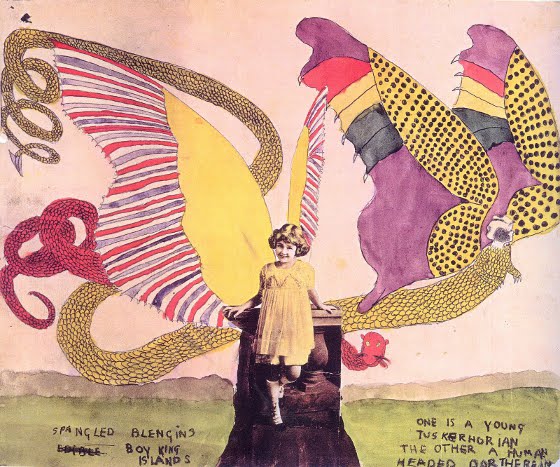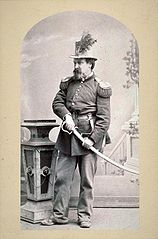"When you're born, you get a ticket to the freak show. When you're born in America, you get a front row seat."
- George Carlin
Our countdown of the 50 Greatest American Weirdos was just too much weird even for Keep America Week. I've taken a few tentative steps back toward sanity, and my doctor says I'm stable enough to take a crack at weirdos #20-11. Come with me now and stare into the void...

#20. Henry Darger: For 60 years, none of Henry Darger's Chicago neighbors had any idea that the eccentric, solitary janitor was quietly creating one of the most massive and original works of art in American history. The 15,145 pages of In the Realms of the Unreal chronicle an uprising of child slaves against their masters in the mythical kingdom of Abbieannia, led by seven princesses known as the Vivian Girls. Darger illustrated this elaborate epic with hundreds of indescribable scrolls, combining watercolor painting, figures traced from the newspapers and magazines Darger picked up off of the street, themes of martyrdom from Darger's deep Catholic faith, and the phantasmagoric visions of Darger's own imagination.
Darger's mythology isn't easy to absorb. But his genuine anguish at the vulnerability and mistreatment of children - rooted in his own troubled, institutionalized youth - is never in doubt. When the 80-year-old Darger finally moved out of his apartment into a rest home, this massive work could easily have been pulped with the rest of the garbage he obsessively collected. But his landlord was a renowned photographer who recognized the unsettling genius of Darger's work, preserved it, and publicized it. It's been inspiring artists, writers, bands, and filmmakers ever since.
#19. Howard Hughes: In a country as crazy as America, it takes a lot of lunacy to become synonymous with "weirdo". But Howard Hughes was as rich in eccentricity as he was in cash. As he got older, richer, and weirder, the public stopped thinking of him as a technical prodigy, brilliant aviator, Hollywood producer, and business mogul. He was better known for erratic behavior like spending four months naked in a film screening room in 1957-58, relieving himself in empty takeout containers and never bathing, cutting his hair, or clipping his nails. Or suddenly buying up as many restaurants and hotels based in Texas as he could, for reasons known only to him. Or "meals" consisting of dozens of bowls of soup, each thrown away after one bite. Or refusing to touch anything without a tissue. Or purging all non-Mormons from his retinue, even though he himself was not a Mormon. Hughes stands today as the ultimate symbolic reckoning of the price of genius: in his case, codeine addiction, chronic pain, and obsessive-compulsive disorder.
#18. Sky Saxon: For many of the movers and shakers of the '60s counterculture, the psychedelic rhetoric of the time was just a phase on the way to a career hawking ice cream or investment services. Sky Saxon lived the rhetoric and paid the price. His band the Seeds were one of the wilder acts of the era, but he was just getting started. After spending a chill-out decade in Hawaii with the cult led by Father Yod (already featured in this list), Saxon returned to L.A. and became a brain-fried fixture on the '80s garage-rock revival scene, clambering up on stage to scream along with every young band in town, whether they liked it or not. Every once in a while, some idealistic acolyte would assemble a band to try to get Saxon's career functioning again, which never worked. When he passed in 2009, he left behind dozens, perhaps hundreds, of releases, ranging from near-hits like "Pushin' Too Hard" to 8-track-only albums of which less than ten copies were ever made. But nobody could say he ever sold out.
#17. Edith Beale & Edith Beale: A dilapidated mansion, a vanished fortune, a mother and daughter with the same name who stubbornly refuse to leave their squalid family estate or their dysfunctional relationship with each other: it's all almost too cinematic to be real. (And that's before we even get to the Jackie Kennedy connection...) But Grey Gardens, the Maysles brothers' documentary about Edith "Big Edie" Beale and Edith "Little Edie" Beale, was an unadorned and unsparing look at the real-life Beales' decrepitude and love. Their dogged elegance also inspired a play, a musical, and a 2009 HBO film, also called Grey Gardens, that won enough awards to fill all of Grey Gardens' 14 rooms.
#16. Wesley Willis: In 1994, some friends of mine told me about a guy who would sometimes come by their Chicago loft to sell his marker drawings and sing songs. He clearly had some mental issues, they said, but he was really friendly and really funny. One day, he brought by a tape containing five songs he'd recorded with a loud rock band. From the spoken intro of "He's Doing Time In Jail", I was a Wesley Willis fan.
Within a few years, he was an underground phenomenon, releasing hundreds of songs with titles like "I Whipped Spiderman's Ass" and "The Bar is Closed", and touring all over the country. And it got weird and uncomfortable to see hordes of obnoxious, privileged white dudes hooting and howling at the antics of a mentally ill black man. I wrote the whole thing off as a cruel sideshow, embarrassed that I'd ever played along. But both the goons and I got it wrong. They saw somebody to ridicule. I saw somebody to pity. Neither of us saw somebody who had overcome all of the biggest obstacles our society can throw at you to make the "joy ride music" that, probably literally, kept him alive.

#15. Emperor Norton: It's easy to complain about the inadequacies of the American legal and political system. Bankrupt rice importer Joshua Norton did something about it. On September 17, 1859 in San Francisco, he declared himself Emperor of the United States "at the peremptory request and desire of a large majority of the citizens." Over the 21 years of his reign, he abolished Congress, banned both the Democratic and Republican parties, stopped an anti-Chinese race riot, and granted an "Imperial Pardon" to a policeman who tried to have him committed. He also called for a League of Nations and decreed a bridge across San Francisco Bay, decades before either came to fruition. Decked out in gold braid with a peacock feather on his hat on his frequent "inspections" of San Francisco's streets, Emperor Norton commanded free meals at the finest restaurants in town, and the eternal goodwill of fellow eccentrics in the City by the Bay and beyond.
#14. Jack & Rexella Van Impe: The eternally hairsprayed Jack van Impe has been peddling his brand of apocalyptic Evangelical Christianity for so long, there's a sample of him denouncing rock and roll in a 1967 Bob Seger single. The stubborn refusal of the Four Horsemen to despoil the land hasn't stopped Van Impe or his hairspray from buying time on TV stations all the way across the country to explain the Revelationship between the Rapture and, say, black holes, or computer processors. His equally impressively coiffed wife Rexella brings a lighter touch, meandering through recitations of headlines from Newsweek and Time that often have litle to do with whatever Jack is worked up about. It's all interspersed with plenty of exhortations to add Jack's latest DVDs to your collection, for a modest donation, of course. The fun couple of Armageddon is wrong about everything, all the time. But as infomercial pitchmen go, they're a lot more interesting than Billy Mays.
#13. G.G. Allin: Punk rockers, don't bother trying to be depraved, sleazy, violent, nauseating, offensive, idiotic, obnoxious, or disgusting. You'll never surpass G.G. Allin. The clip above is one of the few songs of his we could post here. (And easily his catchiest.) If you go Googling for more, we take no responsibility for what you might find.

#12. Emily Dickinson: As Emily Dickinson's literary powers grew, her world got smaller and smaller. Tending to her chronically ill mother, Dickinson discovered in her 20s that she preferred the company of her books and her plants to people. The rest of her life was a steady withdrawal from the outside world. First she stayed inside her hometown of Amherst, then the grounds of her family home, finally rarely leaving her bedroom. At times, she could only speak to other people through a closed door. Today, we know her as the writer who, along with fellow weirdo Walt Whitman, established an authentically American voice in poetry. Her neighbors knew her as the spectral old lady in white that they almost never saw.
#11. Dennis Rodman: The Chicago sports media of the mid-'90s may not seem like the friendliest scene for a gender-bending green-haired loudmouth in a cowboy hat and feather boa. But every time Dennis Rodman, in full camp mode, went into a studio full of beefy, mustachioed sports-talk guys, they thought he was the greatest thing since pickle relish. From running with the bulls to wrestling with Hulk Hogan, from posing naked for PETA to piercing every loose chunk of flesh on his body, he's done so much freaky stuff that it's easy to forget that he was the best defensive forward of his time. His buttoned-down teammate Michael Jordan was electrifying on the court but dull as pinstripes off of it. Rodman was exciting everywhere.
The summit of Mount Weird is in view. Coming soon: Part 5 of the 50 Greatest American Weirdos, featuring the ten greatest weirdos in the history of our very weird country.


